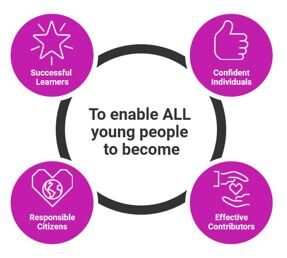Curriculum for Excellence places learners at the heart of education. At its centre are four fundamental capacities. These capacities reflect and recognise the lifelong nature of education and learning. The four capacities are aimed at helping children and young people to become:
- Successful learners
- Confident individuals
- Responsible citizens
- Effective contributors
As part of their learner journey, all children and young people in Scotland are entitled to experience a coherent curriculum from 3 to 18, in order that they have opportunities to develop the knowledge, skills and attributes they need to adapt, think critically and flourish in today’s world.
Curriculum is defined as the totality of all that is planned for children and young people from early learning and childcare, through school and beyond. That totality can be planned for and experienced by learners across :
- Curriculum areas and subjects
- Interdisciplinary learning
- Ethos and life of the school
- Opportunities for personal achievement
Curriculum for Excellence is divided into two phases: the broad general education and the senior phase. The broad general education begins in early learning and childcare and continues to the end of S3 (the third year of secondary school). Its purpose is to develop the knowledge, skills, attributes and capabilities of the four capacities of Curriculum for Excellence:
- Successful learners
- Confident individuals
- Responsible citizens
- Effective contributors
It is designed to provide the breadth and depth of education to develop flexible and adaptable young people with the knowledge and skills they will need to thrive now and in the future. It aims to support young people in achieving and attaining the best they possibly can.
Curriculum is defined as the totality of all that is planned for children and young people from early learning and childcare, through school and beyond. Children’s and young people’s learning should be planned for and experienced across the four contexts.
During the broad general education, children and young people should:
- achieve the highest possible levels of literacy, numeracy and cognitive skills;
- develop skills for learning, skills for life and skills for work;
- develop knowledge and understanding of society, the world and Scotland’s place in it, much of which is now included in Learning for Sustainability;
- experience challenge and success so that they can develop well-informed views and the four capacities
In this section you will find copies of the school policies that are in place to help deliver the commitment and education described above.
Education Scotland



